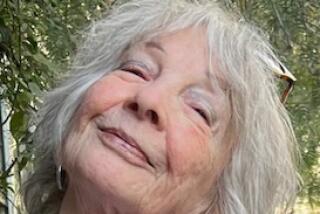‘Ruckuses’ Abbie Hoffman Raised Were Part of the Greening of America
- Share via
When Abbie Hoffman testified in his own behalf during the Chicago Seven conspiracy trial in 1969-70, he described himself as “an orphan of America.”
In some ways, this paralleled Jerry Rubin’s much-quoted, and often ill-understood, remark that members of the counterculture should kill their parents. Both men, in their own idiom, were emphasizing that the only way by which the new generation could truly part itself from the old and move onto new pathways was to orphanize itself, at least symbolically, thus echoing Jesus’ admonition that sons had to be separated from fathers and daughters from mothers if the New Jerusalem was ever to be achieved.
The news accounts reporting that Abbie’s body had been found, fully clothed, lying on his bed in an apartment in rural Pennsylvania all emphasized that he was 52 years old. The photographs that accompanied the reports of his death in the newspapers portrayed a middle-aged man with furrowed face, grizzled beard and thinning hair. Was this the person, I wondered, who had so boldly proclaimed, two decades and more ago, that he would “trust no one over 30?”
Shortly before he died, Abbie bemoaned the fact that a majority of the country’s present-day college students appeared to him to have lost their willingness to stand up for any of the issues that had punctuated his own activist career. In some ways, he was giving grudging recognition to the hard fact that the yuppie road taken by Rubin, his erstwhile sidekick in so many anti-Establishment demonstrations, had proved far more alluring to today’s young people than the one the pair had once traveled together and on which he was eventually to find himself quite alone.
Yet, I find it impossible to dismiss him as an anachronism. The imprint of his life and doings permeates so much of the way we are and were that it is a distinct disservice to history to regard him as just another aging hippie who refused to cut his hair and trim his sails. He was constant to the end to his vision of how a productive life should be lived and, if there is not universal recognition of his enduring value, the fault lies not with him but with our own flutterings.
From the day he journeyed to Mississippi in the early 1960s to join the small band of civil rights workers seeking to register black voters to his most recent, albeit unsuccessful, effort to prevent the diversion of water from the Delaware River to a nuclear power plant, Abbie never deviated from his vision of the struggle.
His political agenda was more general than it was specific. He vehemently opposed racism, sexism, harsh (and largely ineffectual) drug laws, ecological destruction and, above all, this country’s military involvement in Southeast Asia. To combat these perceived evils, he utilized ridicule and theater to a degree never attained by any other contemporary social critic. The nomination of a pig for President in 1968, the throwing of dollar bills upon the floor of the New York Stock Exchange, the attempted levitation of the Pentagon, the variety of “be-ins” in parks around the country, the wearing of a flag shirt before the late and hardly lamented House Un-American Activities Committee and the ability to enlist such luminaries as Allen Ginsberg, Jon Voight, Dustin Hoffman, Rip Torn, Arlo Guthrie, Norman Mailer and Judy Collins, to name but a few, in his “ruckuses,” as he called them, were just some of the weapons in his prodigious armory.
Rubin, in commenting on Abbie’s death, stated that he was a “one-of-a-kind American hero.” It is a given that there will never be any marble memorials in Washington for him and that the history books of the future, if they mention him at all, will relegate his contributions to a footnote or less. But those in the know, those who fought alongside him in Chicago’s Lincoln Park in the climactic August of 1968, those who harkened to (and understood) his Woodstock philosophy, those who, like Amy Carter, joined him in the protest against CIA recruitment on the University of Massachusetts campus--they comprehend and appreciate full well the crucial role he played in the greening of America.
I do not believe that he would have wanted his friends to eulogize him. If he could speak from wherever his ebullient spirit now resides, he would undoubtedly urge us all to keep on keeping on. His books, his actions and the sheer memories of him will, I so fervently hope, outlive his corporeal presence and well may convince those latter-day college students, whose attitudes and activities he so fervently questioned, that Rubin indeed took the wrong road and that the one that truly leads to the Emerald City is the hardy avenue he traveled.
I will always be the richer for having lived a while in Abbie Hoffman’s glow. It lit my night and glorified my day. I will surely never, in my own lifetime, see his like again, and I can only hope that he will influence the future of this land as he did the past.
More to Read
Sign up for Essential California
The most important California stories and recommendations in your inbox every morning.
You may occasionally receive promotional content from the Los Angeles Times.










